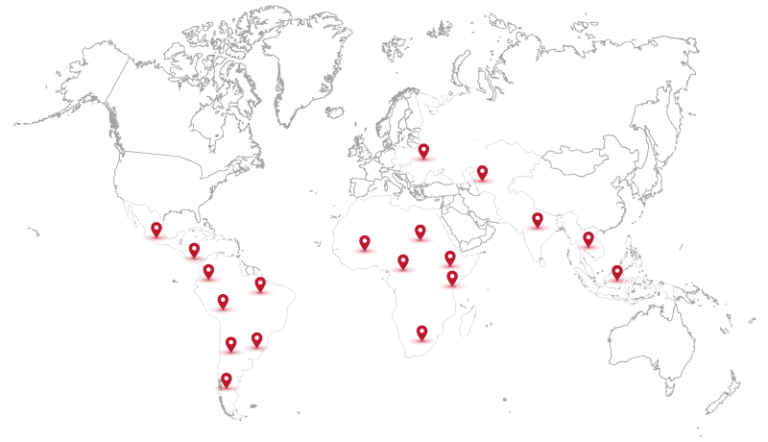- Home-based workers (HBWs) are those who produce goods or services in or near their homes for local, domestic or global markets. They work across many industries in the economy
- The International Labor Organization estimates that 7.9 % of the world’s workforce worked from home on a permanent basis prior to the COVID-19 pandemic, representing approximately 260 million HBWs around the world, of this amount 147 million (57 %) were women.
February 24th –HomeNet International (HNI)
celebrated its official launch and first virtual Congress,
marking the end of a two-year process in which HBW
organizations worked together to lay the foundations
for the global network.
The historic two-day virtual event brought together more than 280 HBWs from 20 countries, along with supporters, sister organizations and major allies such as Sharan Burrow, the General Secretary of the International Trade Union Confederation (ITUC) and Sally Roever, International Coordinator of Women in Informal Employment: Globalizing and Organizing (WIEGO).
Most delegates of HNI’s first virtual Congress have worked from home even before the COVID-19 pandemic. They are mostly women who represent garment workers, carpet weavers, food processors and packers, amongst so many other fields of work.
Like other informal workers, most HBWs do not enjoy adequate economic opportunities, legal rights, social protection or a representative voice. These are only a few reasons that gave life to HNI’s vision: “HomeNet International was created to provide greater visibility and recognition of HBW’s, especially women, and for a strong, united, and representative voice on global platforms where HBWs effectively engage and challenge those, such as governments and employers, who have power over their working lives” said Janhavi Dave, HNI International Coordinator.
The historic two-day virtual event brought together more than 280 HBWs from 20 countries, along with supporters, sister organizations and major allies such as Sharan Burrow, the General Secretary of the International Trade Union Confederation (ITUC) and Sally Roever, International Coordinator of Women in Informal Employment: Globalizing and Organizing (WIEGO).
Most delegates of HNI’s first virtual Congress have worked from home even before the COVID-19 pandemic. They are mostly women who represent garment workers, carpet weavers, food processors and packers, amongst so many other fields of work.
Like other informal workers, most HBWs do not enjoy adequate economic opportunities, legal rights, social protection or a representative voice. These are only a few reasons that gave life to HNI’s vision: “HomeNet International was created to provide greater visibility and recognition of HBW’s, especially women, and for a strong, united, and representative voice on global platforms where HBWs effectively engage and challenge those, such as governments and employers, who have power over their working lives” said Janhavi Dave, HNI International Coordinator.
The Invisible Workforce
HBWs contributions to the economy remain largely invisible and undervalued. Their economic activities are often dismissed as an extension of their domestic work, rather than being recognized as production for the market that contributes to the economy.
“Although they make a vital contributions to the well-being of their families and to the national and global economies, they are largely invisible, unrecognized, unheard and unacknowledged as economic actors and contributors” stated HNI’s Interim International Working Group.
According to WIEGO’S Economy Monitoring Study (IEMS), HBWs make significant contributions to society. Some of their most valuable contributions are:
“Although they make a vital contributions to the well-being of their families and to the national and global economies, they are largely invisible, unrecognized, unheard and unacknowledged as economic actors and contributors” stated HNI’s Interim International Working Group.
According to WIEGO’S Economy Monitoring Study (IEMS), HBWs make significant contributions to society. Some of their most valuable contributions are:
- Their earnings keep their households out of extreme poverty.
- While working from home, they can care for children and the elderly and maintain the quality of family life.
- Self-employed home-based workers provide goods and services at a low cost to the public.
- Homeworkers (sub contracted home-based workers) produce goods at low prices for domestic and global value chains.
- They are economic agents, buying supplies, raw materials, and equipment and paying for transport and services.
- They pay taxes on raw materials, supplies and equipment they purchase.
A New Kind of Isolation: COVID-19
Currently HBWs are facing extreme challenges under COVID-19. They are highly vulnerable to the health effects of the virus and to the short and long term economic consequences. Those who produce goods and services for local markets or as subcontracted workers for national and global supply chains have not had orders for months. Most live in poverty and work just to survive, if they are unable to work there is no food on the table.
According to Janhavi Dave, HNI International Coordinator, “Home-based workers are last in line to benefit from any help being provided by brands, manufacturers or governments. Many have not been paid for months and are not expecting work any time soon.”
According to Janhavi Dave, HNI International Coordinator, “Home-based workers are last in line to benefit from any help being provided by brands, manufacturers or governments. Many have not been paid for months and are not expecting work any time soon.”
HBW’s Key Demands
- Ratification of ILO C177 and national policy
- Recognition by brands that HBWs are workers and contributors to their supply chains.
- Decent working conditions: social protection, minimum wages, and violence–free work.
- COVID–19 recovery plans responsive to their needs.
- Inclusion in national labor protections, income support policies, and other crisis or emergency funds such as those for COVID–19.



